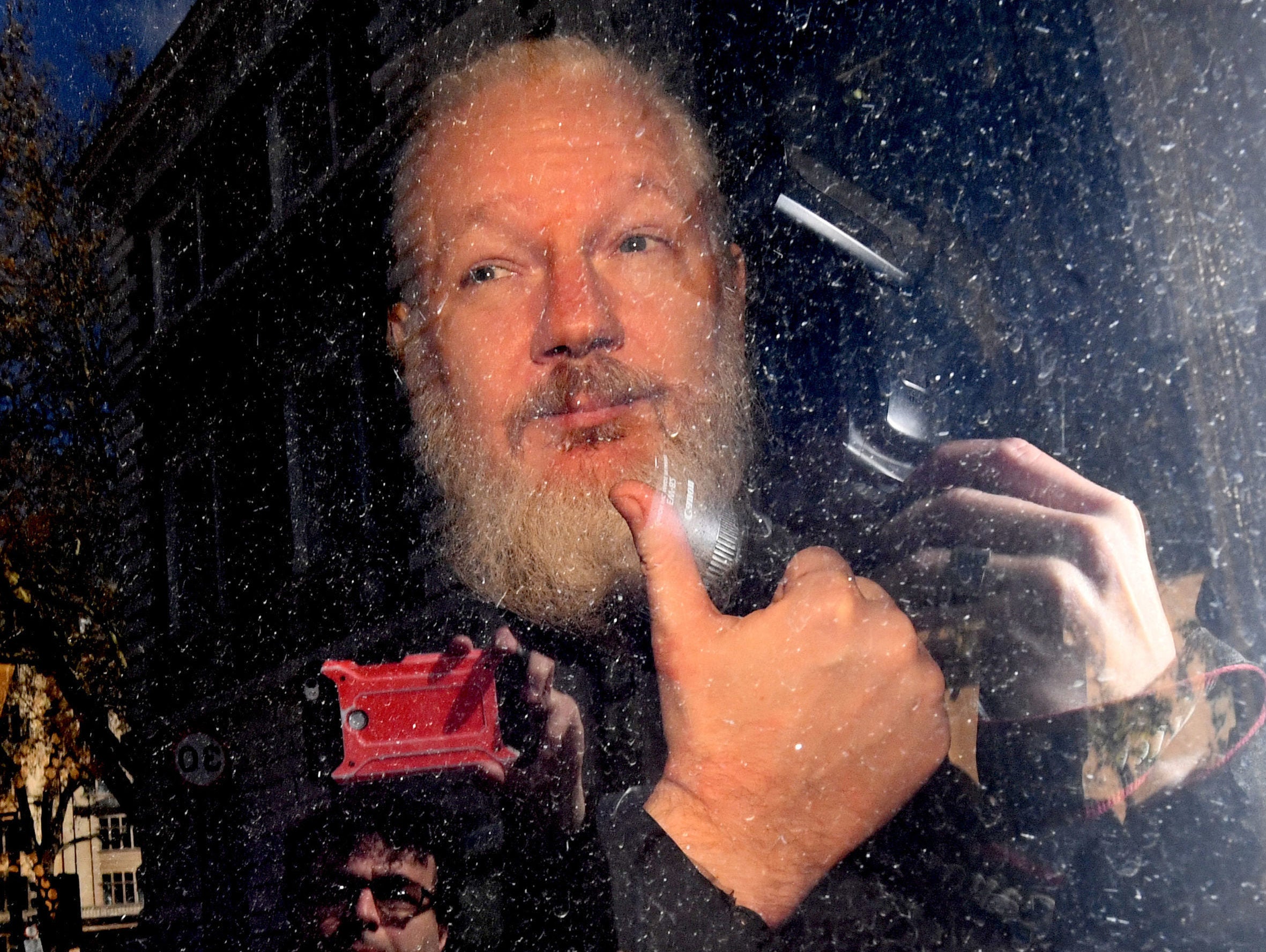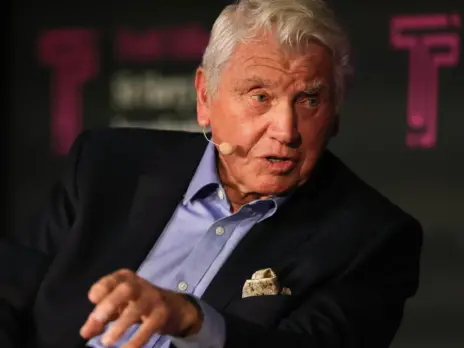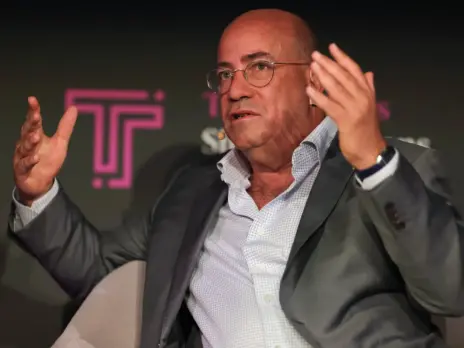
Wikileaks founder Julian Assange is facing extradition to the United States after he was arrested inside the Ecuadorian embassy in London today and forcibly removed from the building by police.
He has been charged with conspiring with former US military analyst Chelsea Manning to hack into a US government computer to obtain secret information in March 2010, the US Department of Justice said today.
It alleged that Assange, 47, had played a role in “one of the largest compromises of classified information in the history of the United States”. The charge carries a maximum penalty of five years in prison.
Met Police confirmed that Assange has been arrested “on behalf of the United States authorities” under an extradition warrant.
Assange had been living at the Ecuadorian embassy in Knightsbridge for nearly seven years, having sought asylum while on police bail in June 2012 to avoid extradition to Sweden over sexual offence charges.
He always denied the charges, which have since been dropped although legal counsel for the alleged victim today requested the preliminary investigation be reopened, Reuters reported.
Ecuadorian president Lenin Moreno withdrew Assange’s asylum today in what he said had been a “sovereign decision” that followed Assange’s “repeated violations to international conventions and daily-life protocols”.
The Ecuadorian ambassador invited Met Police officers inside the embassy this morning where they arrested Assange over his failure to surrender to the court (the arrest for the US came later). He was found guilty of this charge at Westminster Magistrates’ Court this afternoon.
He remains in police custody and could face up to a year in jail when he is sentenced at Southwark Crown Court at a later date.
Assange’s surprise arrest this morning was missed by the British media, with only one small news agency stationed outside the embassy capturing footage of him being hauled to a police van by five police officers.
The clip shows him sporting a white beard and he can be heard shouting “the UK must resist this attempt by the Trump administration…” and what sounded like “the UK has no sovereignty”.
BREAKING: #Assange removed from embassy – video pic.twitter.com/qsHy7ZVPg5
— Ruptly (@Ruptly) April 11, 2019
Tensions had been rising lately between Assange and the embassy, which he claimed had shut off his access to the internet, forcing him to step down as Wikileaks editor in September last year.
At a press conference yesterday his replacement, Kristinn Hrafnsson, accused Ecuador of carrying out an “extensive spying operation” against Assange from within the embassy.
In a statement on Twitter on Assange’s arrest, Home Secretary Sajid Javid said: “Nearly seven years after entering the Ecuadorean embassy, I can confirm Julian Assange is now in police custody and rightly facing justice in the UK.
“I would like to thank Ecuador for its co-operation and Met Police for its professionalism. No one is above the law.”
Foreign Secretary Jeremy Hunt added: “Julian Assange is no hero and no one is above the law. He has hidden from the truth for years.”
Ecuador’s Foreign Ministry said it has received guarantees from Britain “that there are no risks for the life and integrity of Mr Assange”.
It added: “Great Britain has offered guarantees, at the request of Ecuador, that if an extradition request were submitted, it would not be delivered to a country where it could be imposed and executed the death penalty or be subject to torture or ill-treatment.”
Ecuador also blamed Assange’s “repeated violation” of norms set out under conventions on diplomatic asylum.
Wikileaks has claimed Ecuador “illegally terminated” Assange’s political asylum “in violation of international law”.
Assange’s US charge sheet alleges he helped Manning try and crack a password that would have allowed her to log on to state computers under a different username and so aid her in avoiding detection.
However prior to this “password-cracking agreement” she had already provided Wikileaks with “hundreds of thousands of classified records” downloaded from US departments and agencies, the indictment claimed.
Reporters Without Borders called on the UK to “stick to a principled stance” in relation to requests from the US for Assange’s extradition and ensure he is protected under UK and EU law “relevant to his contributions to journalism”.
Its secretary-general, Christophe Deloire, added: “Targeting Assange after nearly nine years because of Wikileaks’ provision of information to journalists that was in the public interest (such as the leaked US diplomatic cables) would be a purely punitive measure and would set a dangerous precedent for journalists, whistleblowers, and other journalistic sources that the US may wish to pursue in the future.”
The National Union of Journalists said it was “shocked and concerned” by today’s events and that the UK should not act “on behalf of the Trump administration”.
Seamus Dooley, assistant general secretary of the NUJ, said: “The NUJ recognises the inherent link between and importance of leaked confidential documents and journalism reporting in the public interest.
“It should be remembered that in April 2010 WikiLeaks released Collateral Murder, a video showing a 2007 US Apache helicopter attack upon individuals in Baghdad, more than 23 people were killed including two Reuters journalists.
“The manner in which Assange is treated will be of great significance to the practice of journalism.”
The Washington Post has warned its readers not to “celebrate” Assange’s indictment, with its opinion writer Paul Waldman writing: “…whatever you think of WikiLeaks, if we criminalize receiving classified information, some of the most important works of journalism in American history would be transformed into crimes, and every reporter who works on national security would be a potential criminal.”
Former Guardian editor Alan Rusbridger, who published stories on the classified data leaked to Wikileaks, and whistleblower Edward Snowden, were among those sharing their reaction to Assange’s arrest on Twitter.
Have often not seen eye to eye with Assange. Aspects of his behaviour over the years trouble me – eg never liked indiscriminate dumping of unredacted material. But have always said would stand by him in defence of what Guardian and @nytimes published in 2010/11
— alan rusbridger (@arusbridger) April 11, 2019
Images of Ecuador's ambassador inviting the UK's secret police into the embassy to drag a publisher of–like it or not–award-winning journalism out of the building are going to end up in the history books. Assange's critics may cheer, but this is a dark moment for press freedom. https://t.co/ys1AIdh2FP
— Edward Snowden (@Snowden) April 11, 2019
The action of the British police in literally dragging Julian Assange from the Ecuadorean embassy and the smashing of international law by the Ecuadorean regime in permitting this barbarity are crimes against the most basic natural justice. This is a warning to all journalists.
— John Pilger (@johnpilger) April 11, 2019
The U.S. government indictment of Julian Assange is an aggressive and potentially chilling legal document for journalists in the U.S. and abroad.
That is a significant issue regardless of one's view of Assange as a person, or his work, or his politics.
— “the reporter” (@AriMelber) April 11, 2019
Email pged@pressgazette.co.uk to point out mistakes, provide story tips or send in a letter for publication on our "Letters Page" blog






